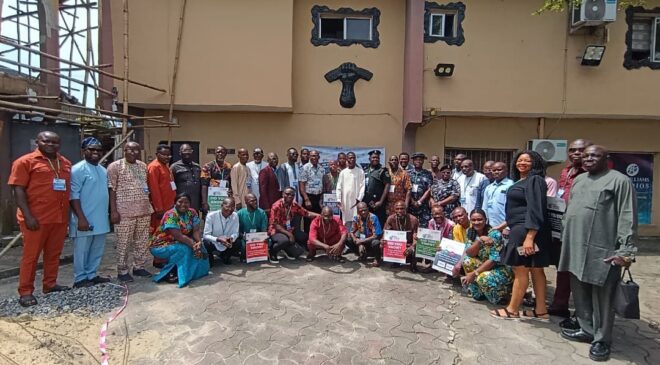
By Emmanuel Enebeli
EFFURUN/Nigeria: The Male Feminist Network (MFN) Project took a major step forward in advancing gender equality and combating gender-based violence (GBV) as stakeholders, trainers, and advocates gathered for a two-day Training of Trainers (ToT) workshop organized by the Value Rebirth and Empowerment Initiative (VREI) in collaboration with the African Centre for Leadership, Strategy and Development (Centre LSD), with support from the Ford Foundation.
Held at Casa De Pedro Hotel, Warri, from November 7–8, 2025, the workshop brought together community leaders, faith leaders, youth advocates, media practitioners, and gender champions from across the South-South region. The aim was to empower participants with practical skills, knowledge, and tools to engage men as allies in promoting gender equality and ending violence against women and girls.
In his welcome address, the Executive Director of Value Rebirth and Empowerment Initiative (VREI), Ambassador Pastor Edewor Egedegbe, described the Male Feminist Network as a transformative movement committed to reshaping mindsets, challenging stereotypes, and building a society rooted in fairness, justice, and equality.
“The Male Feminist Network is more than a project; it is a movement that seeks to engage men as advocates for positive change,” Egedegbe said. “By breaking down harmful norms and equipping men with knowledge and empathy, we can ensure that the message of equality and non-violence reaches every home, community, and institution.”
He commended the Ford Foundation for its sustained commitment to gender justice and applauded the African Centre for Leadership, Strategy, and Development for its leadership in coordinating the initiative across Nigeria’s six geopolitical zones.
Delivering a keynote address at the workshop, the Founding Executive Director of Centre LSD, Dr. Otive Igbuzor, emphasized that leadership is not only about influence but about transformation, transforming individuals, communities, and systems to dismantle patriarchy and create spaces of equality and dignity.
“Gender-based violence remains one of the deepest scars in our social fabric,” Dr. Igbuzor said. “In the Niger Delta, where poverty, inequality, and displacement are prevalent, GBV takes many forms — intimate partner violence, sexual assault, economic deprivation, and psychological abuse. These are symptoms of a patriarchal structure that harms both women and men.”
He noted that patriarchy not only oppresses women but also traps men in cycles of emotional suppression, dominance, and aggression.
“Patriarchy imprisons men too, forcing them to suppress empathy and accountability,” he remarked, stressing that the fight against gender violence must include men as allies, not bystanders.
Dr. Igbuzor further highlighted the role of male feminists as advocates of shared humanity rather than rescuers.
“The role of men in ending GBV is not about rescuing women; it is about rescuing our shared humanity. Male feminism calls us to empathy, accountability, and solidarity — not to lead women’s struggles but to transform the spaces where men’s power perpetuates injustice,” he stated.
Participants at the workshop resolved to promote feminist values, equip men with preventive and responsive strategies against GBV, and cascade training sessions within their communities. The communiqué issued at the end of the event outlined key resolutions, including commitments to engage men as key advocates, conduct step-down trainings, and take proactive measures to identify and respond to signs of violence at the community level.
The communiqué also underscored the need to correct misconceptions about feminism.
“We recognize that feminism is often misunderstood and commit to promoting a more accurate understanding of feminism as a movement that seeks equality, justice, and human rights for all,” it stated, adding that the involvement of men is critical in achieving these goals.
Participants further pledged to engage traditional rulers, religious leaders, and policymakers to reform discriminatory norms and laws that sustain gender inequality. They also committed to serving as role models of healthy masculinity, demonstrating that true strength lies in compassion, respect, and emotional intelligence.
Dr. Igbuzor outlined five practical steps for male feminists, urging them to educate and unlearn harmful social norms, model empathy and humility, intervene in cases of abuse, advocate for structural change, and strengthen collective action through the Male Feminist Network.
“The Niger Delta has produced some of Nigeria’s most courageous voices for justice. It is time we extend that courage to gender justice,” he said. “When men rise for women, communities rise for humanity. When men stand for justice, stability is restored to families, workplaces, and nations.”
Adding his voice, Professor Andrew Agboro, a facilitator and Chairman of the Delta State Civil Society Organizations Forum, described gender-based violence as a symptom of deep-rooted cultural and systemic inequality.
“The primary precursors of gender-based violence (GBV) in Nigeria are deeply rooted in harmful cultural norms and patriarchal systems that foster gender inequality,” Professor Agboro explained. “These are further exacerbated by significant socioeconomic disparities, and in some cases, conflict and a weak legal environment.”
He added that patriarchy and unequal power relations often lead to the subjugation of women, with resultant effects such as forced marriage, slow socio-economic progress and development, conflict, family disintegration, wife beating, drug abuse, school dropouts, poverty, unemployment, and political marginalization — all fueled by underreporting and lack of awareness.
Also contributing, Ambassador Peace Edem, one of the facilitators, emphasized the importance of sustained advocacy and community ownership in tackling GBV. She encouraged participants to step down the training and ensure that local communities internalize and act upon the lessons shared.
The workshop ended with a strong call to action urging all stakeholders — including government institutions, civil society organizations, and community groups — to join forces in combating gender-based violence and supporting the expansion of the Male Feminist Network across the Niger Delta and beyond.
“We are committed to building a safer and more just society for all,” the communiqué concluded. “Together, we can dismantle gender inequality and create communities where men and women live with mutual respect, dignity, and safety.”
